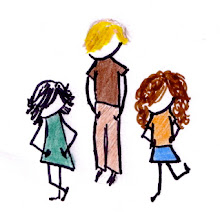
Reading Katy McColl's Should I Do What I Love? Or do what I do so I can do what I love on the side?
I'll confess my bias from the beginning: I adore Katy McColl. For years I followed her work in Jane magazine. As far as writers go, she's got a sharp, amiable wit of the sassy best friend whose emails leave you grinning all day. So when I found out she had written a book, I ordered a copy immediately. It could have been about the history of drywall, I didn't care, I still waited by my postbox every morning. But what did arrive was this book; a savvy life manual for people like me. It's for people whose artistic sensibilities are full of drive but lacking in direction. McColl's smart, witty advice on finding a creative career is encouraging without being patronizing (a common flaw, I've found, in the self-help/life coach field). As she says, "...what induces a so-called quarter-life crisis is taking on jobs that are already out there, when the truly fulfilling trajectories are the ones you create for yourself."
The first section, "When You Don't Know What You Want to Do," includes tips on how to pinpoint your goals, career and otherwise, and refine them from broad ideas into precise plans. Heck, I did the exercises just for funsies, but came out with much more focused goals than my ambivalent life motto, "be a writer." The book discourages higher education as a means of delaying the post-grad decision-making process, saying, "Trust me, there are many more delicious ways to go into debt than running a tab with the U.S. Department of Education."
A section for those who doubt the paths they're taking is "When You Don't Like What You Do but You're Too Old to Start at the Bottom - Again." Here, McColl talks about transitioning from a drone job to a creative one, working your connections, and selling yourself effectively. These tips are helpfully peppered with relatable quotes from other struggling quarter-lifers trying to find their creative career paths.
She explains how to pick a smart starter job in "How to Survive Being an Assistant," with plenty of tips for maximizing your beginner status in the field. Among other things, McColl suggests choosing a boss who can be a role model, and using the connections you make. My favourite quote? "[Networking] sounds like a gauche and greedy pastime when in fact, networking is just a wonky synonym for Charming the Pants Off People." Here there's great advice on how to meet insiders in your field without coming across as shameless or pushy.
Those who have known since preschool that their passion lies in design/film/cooking will benefit from the second half of the book. Here, there is a collection of advice and success stories from professionals in different creative fields. These tips are in the form of candid, friendly advice from some OMG names like DJ AM, novelist Jonathan Ames, and NYC fashion designers Heatherette.
Immediately, I passed this book on to every friend on the radar with a little bit of career confusion. After all, I'm currently teaching English in South Korea with thousands of twentysomethings, and "I'm not thinking long-term about jobs," might as well be the mantra for our kind.
My friends, however, had some self-help skepticism. "I can't read it on the subway or in coffeeshops," they explained, "I don't want people to see that I'm reading a self-help book."
"But it's not!" And it isn't. McColl doesn't push any self-pity, self-aggrandizement, self-hugging or self-obsession. Rather, it's a wise peptalk from a sage friend. It's a long, hard conversation with your most admired aunt or sister-in-law. It's the closest thing to a grown-up guidance counsellor that many people can get.
So stop being too cool and buy the book already. You won't regret it.









